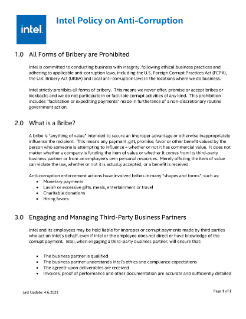Intel Policy on Anti-Corruption
1.0 All Forms of Bribery are Prohibited Intel is committed to conducting business with integrity, following ethical business practices and adhering to applicable anti-corruption laws, including the U.S. Foreign Corrupt Practices Act (FCPA), the U.K. Bribery Act (UKBA) and local anti-corruption laws in the locations where we do business. Intel strictly prohibits all forms of bribery. This means we never offer, promise or accept bribes or kickbacks and we do not participate in or facilitate corrupt activities of any kind. This prohibition includes “facilitation or expediting payments” made in furtherance of a non-discretionary routine government action. 2.0 What is a Bribe? A bribe is “anything of value” intended to secure an improper advantage or otherwise inappropriately influence the recipient. This means any payment, gift, promise, favor or other benefit valued by the person who someone is attempting to influence – whether or not it has commercial value. It does not matter whether a company is funding the item of value or whether it comes from its third-party business partner or from an employee’s own personal resources. Merely offering the item of value can violate the law, whether or not it is actually accepted, or a benefit is received. Anti-corruption enforcement actions have involved bribes in many “shapes and forms”, such as: • Monetary payments • Lavish or excessive gifts, meals, entertainment or travel • Charitable donations • Hiring favors 3.0 Engaging and Managing Third-Party Business Partners Intel and its employees may be held liable for improper or corrupt payments made by third parties who act on Intel’s behalf, even if Intel or the employee does not direct or have knowledge of the corrupt payment. Intel, when engaging a third-party business partner, will ensure that: • • • • The business partner is qualified The business partner understands Intel’s ethics and compliance expectations The agreed-upon deliverables are received Invoices, proof of performance and other documentation are accurate and sufficiently detailed Last Update: 4.6.2021 Page 1 of 2 Intel conducts risk-based due diligence on business partners. These can be entities or individuals in the supply chain – such as consultants, marketing agencies and construction contractors, or in the distribution channel – such as distributors, system integrators and resellers. 4.0 Accurate Books & Records Intel must keep books and records that accurately detail and fairly reflect what is done with Intel’s resources. This applies not only to Intel’s reported financial statements and general ledger, but other ordinary business records, such as purchase orders, invoices, expense reports and receipts used to support requests for payment or reimbursements. 5.0 Violations Failure to abide by this policy may subject Intel employees to disciplinary action up to and including termination of employment. For third-party business partners, violation may result in termination of the Intel relationship. Violation of anti-corruption laws may also result in corporate or individual prosecution by government authorities. 6.0 Reporting Concerns Intel provides numerous avenues to employees or third-party business partners to report concerns, including email, telephone, and letter to Intel Legal, or Intel Internal Audit. Click here to find more information for options to report an ethics or legal concern: Reporting Ethics and Legal Concerns Intel does not tolerate retaliation against anyone who in
